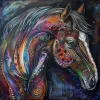
Arion
Arion was typically described as the offspring of Poseidon and Demeter, two of the most important Greek gods; he was born after they laid together in the form of horses. Given his impressive pedigree, Arion was no ordinary horse.
30 posts

Arion was typically described as the offspring of Poseidon and Demeter, two of the most important Greek gods; he was born after they laid together in the form of horses. Given his impressive pedigree, Arion was no ordinary horse.

Eunomia (Greek: Εὐνομία) was a minor Greek goddess of law and legislation, as well as the spring-time goddess of green pastures (eû means "well, good" in Greek, and νόμος, nómos, means "law", while pasturelands are called nomia).

Erysichthon was a king whose addictive behaviors resulted in him eating himself in hunger.

Adonis was a beautiful Greek man who fell in love with himself. OFC is a part of the Orbito Frontal Cortex that appreciates beauty in all its forms

Hegesias (Greek: Ἡγησίας; fl. 290 BC[1]) of Cyrene was a Cyrenaic philosopher, the Cyrenaics forming one of the earliest Socratic schools of philosophy. He argued that happiness is impossible to achieve, and that the goal of life was the avoidance of pain and sorrow.

Arachne was a weaver who acquired such skill in her art that she ventured to challenge Athena, goddess of war, handicraft, and practical reason.

Dispsas was a Greek serpent whose bite caused intense thirst.

Ixion, in Greek legend, son either of the god Ares or of Phlegyas, king of the Lapiths in Thessaly. He murdered his father-in-law. Ixion abused his pardon by trying to seduce Zeus's wife, Hera. Ixion was condemned to torment on a burning wheel for all eternity.

Iambe (Greek: Ἰάμβη) in Greek mythology The extravagant hilarity displayed at the festivals of Demeter in Attica was traced to her, for it is said that when Demeter, in her wanderings in search of her daughter, arrived in Attica, Iambe cheered the mournful goddess with her jokes

Hypnos was a primordial deity in Greek mythology, the personification of sleep. He lived in a cave next to his twin brother, Thanatos, in the underworld, where no light was cast by the sun or the moon; the earth in front of the cave was full of poppies and other sleep-inducing plants.

Cerberus, in Greek mythology, the monstrous watchdog of the underworld. He was usually said to have three heads and heads of snakes grew from his back, and he had a serpent's tail.
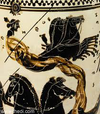
Hemera Day(/ˈhɛmərə/; Ancient Greek: Ἡμέρα [hɛːméra] "Day") was the personification of day and one of the Greek primordial deities. She is the goddess of the daytime and, according to Hesiod, the daughter of Erebus and Nyx (the goddess of night).

goddess of strife and discord. Her Roman equivalent is Discordia, which means "discord". Eris's Greek opposite is Harmonia, whose Roman counterpart is Concordia. Homer equated her with the war-goddess Enyo, whose Roman counterpart is Bellona.

Anteros was the god of requited love, literally "love returned" or "counter-love" and also the punisher of those who scorn love and the advances of others, or the avenger of unrequited love. paraventricular nucleus (hypothalamus), magnocellular division
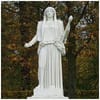
DEMETER was the Olympian goddess of agriculture, grain and bread who sustained mankind with the earth's rich bounty. She presided over the foremost of the Mystery Cults which promised its intiates the path to a blessed afterlife in the realm of Elysium.

Herodotus was a Greek Historian from Ionia. He is most notably known for his writing of The Histories. The first six books deals with the growth of the Persian Empire under the rulers of Croesus and later Cyrus the Great .
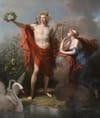
Apollo was a god in Greek mythology, and one of the Twelve Olympians. He was the god of healing, medicine and archery, and of music and poetry. He was the leader of the Muses.

Hera (Roman name: Juno), wife of Zeus and queen of the ancient Greek gods, represented the ideal woman and was goddess of marriage and the family.

Diogenes of Sinope (c. 404-323 BCE) was a Greek Cynic philosopher best known for holding a lantern (or candle) to the faces of the citizens of Athens claiming he was searching for an honest man.
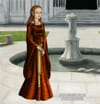
AIDOS (Aedos) was the goddess or personified spirit (daimona) of modesty, shame, reverence and respect. ... As a quality Aidos was the feeling of shame which restrains men from doing wrong.

HIMEROS was the god of sexual desire and one of the Erotes, the winged gods of love. ... Himeros was depicted as winged youth or child. He often appears alongside Eros in scenes of Aphrodite's birth, fluttering around the goddess as she reclines in her conch-shell bed.

Hedylogus (Ancient Greek: Ἡδυλόγος) was the god of sweet-talk and flattery and one of the winged love gods called the Erotes. AHA is involved in sexual approach behaviors. Hedylogos is the Greek god of sweet talk and flatter.

ANANKE was the primordial goddess (protogenos) of necessity, compulsion and inevitability. Area 23c monitors progress of strategy and detects failure to progress towards the outcome.
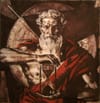
Chronos was the Greek Titan God of Time
The home of neuromythography
